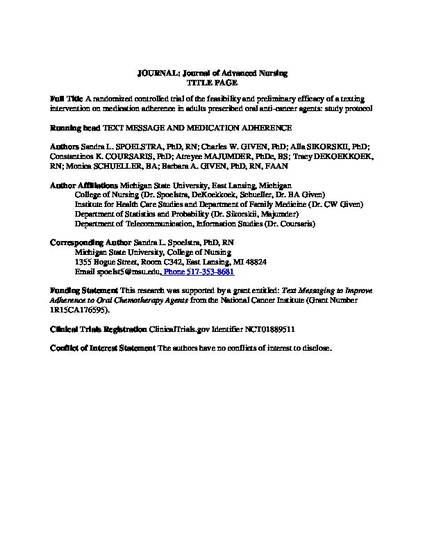
- cancer,
- intervention,
- medication adherence,
- mHealth,
- nursing,
- oral anti-cancer agent,
- randomized controlled trial,
- recruitment,
- text messaging
Aim: The aim of this study was to report a study protocol that examines feasibility, preliminary efficacy and satisfaction of a text message intervention on the outcome of medication adherence in adult patients prescribed oral anti-cancer agents.
Background: Administration of oral anti-cancer agents occurs in the home setting, requiring patients to self-manage the regimen as prescribed. However, many barriers to medication adherence exist: regimens are often complex, with cycling of two or more medications; side effects of treatment; most cancer patients are older with comorbid conditions and competing demands; and cognitive decline and forgetfulness may occur. Research indicates patients miss nearly one-third of the prescribed oral anti-cancer agent dosages. Text message interventions have been shown to improve medication adherence in chronic conditions other than cancer. However, a majority of those patients were less than 50 years of age and most cancer patients are diagnosed later in life.
Design: A two-group randomized controlled trial with repeated measures.
Methods: Seventy-five adult patients newly prescribed an oral anti-cancer agent will be recruited (project funded in April 2013) from community cancer centres and a specialty pharmacy. Participants will be randomized to either a control group (n = 25; usual care) or an intervention group (n = 50; usual care plus text messages timed to medication regimen). Outcome measures include: medication adherence, feasibility and satisfaction with the intervention. Data will be collected over 8 weeks: baseline, weekly and exit.
Discussion: Standardized text message intervention protocol and detailed study procedures have been developed in this study to improve medication adherence.
Spoelstra, S. L., Given, C. W., Sikorskii, A., Coursaris, C. K., Majumder, A., DeKoekkoek, T., … Given, B. A. (2015). A Randomized Controlled Trial of the Feasibility and Preliminary Efficacy of a Texting Intervention on Medication Adherence in Adults Prescribed Oral Anti-Cancer Agents: Study Protocol. Journal of Advanced Nursing, 71(12), 2965–2976. http://doi.org/10.1111/jan.12714
Available at: http://works.bepress.com/sandra-spoelstra/38/
